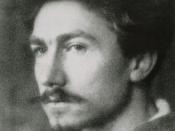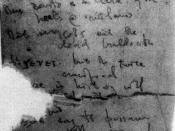Most of us dream of an ideal society. One in which the people select an individual to represent us and be able to know what is in our best interest. Then again, I said dream. In this essay, I will connect three different points in history in which three different individuals have almost identical views on who is best fit to be our ruler. These three individuals are KÃÂung Fu Tzu, better known to us as Confucius from China, Plato, the ancient Greek Philosopher, and Ezra Pound, the modernist Poet from the United States.
Confucius lived from 551-479 B.C. He was a teacher who was largely concerned with ethics, which is the study of value, morals, and morality. He also steered toward politics and is famous for this quote:ÃÂIf the people led by laws, and uniformity sought to be given them by punishments, they will try to avoid the punishment but have no sense of shame.
If they led by virtue, and uniformity sought to be given them by the rules of propriety, they will have the sense of shame, and moreover will become good.ÃÂ (Translated by James Legge, The Great Learning)This is his way of saying that society would be a better one if people based their lives on what is virtuous.
About a century after the Chinese teacher came a Greek philosopher by the name of Plato. Somewhere around 360 B.C. The Republic of Plato was published. Although this book covers many different aspects about society, I will focus on Chapter 13 called The Three Parts of the Soul. In this section Plato states, Wisdom resides in the class of the rulers. They are the most experienced and oldest citizens in their societies. Reason is the element of the soul that is most powerful in the wise men. It is they who judge their fellow citizens and themselves. ÃÂPossessing (wisdom) as it does the knowledge of what is good for each of the three elements and for all of them in common.ÃÂ(page 140 trans. F. M. Cornford: Oxford: Oxford University Press. 1945) Courage is the second virtue; it goes most hand in hand with the auxiliaries (soldiers). While those who are wise will rule, the spirited element of the courageous ought to act as its subordinate and ally. The courageous always cling to reason no matter what the appetite is. Both the wise and courageous will work together by the combination of body (auxiliary) and mind (ruler).
Almost two millennia after Plato an American Poet by the name of Ezra Pound came into the scene as one of the most recognized Modern Poets. In 1962, Pound published a book named The Cantos of Ezra Pound. This is a book which has 120 poems, each called a Canto. The main purpose of the book is to bring to light many different authors and ideas throughout history. In his Cantos he makes references to people from Homer and his epic poem The Odyssey to Dante and his piece DanteÃÂs Inferno. I will focus on one Canto where I feel Pound makes reference to Confucius and Plato, Canto XIII. This Canto begins with a man named Kung, which is short for KÃÂung Fu Tzu, a.k.a. Confucius walking by a river. The few lines out of the Canto that stand out the most are: ÃÂIf a man have not order within him, He can not spread order about him; And if a man have not order within him, His family will not act with due order.ÃÂ (lines 46-49) These lines although are words from Confucianism sound just like Plato when he states that the best ruler will be someone who has enough wisdom.
Societies arenÃÂt always perfect. Many have tried to give their idea on which is the best way for a society to function correctly and smoothly with least amount of obstacles in the way. Although Confucius, Plato, and Pound all came from different times and parts of the globe, we see that all three have very similar philosophies on what makes up a well functioned society.





